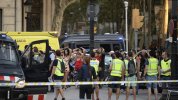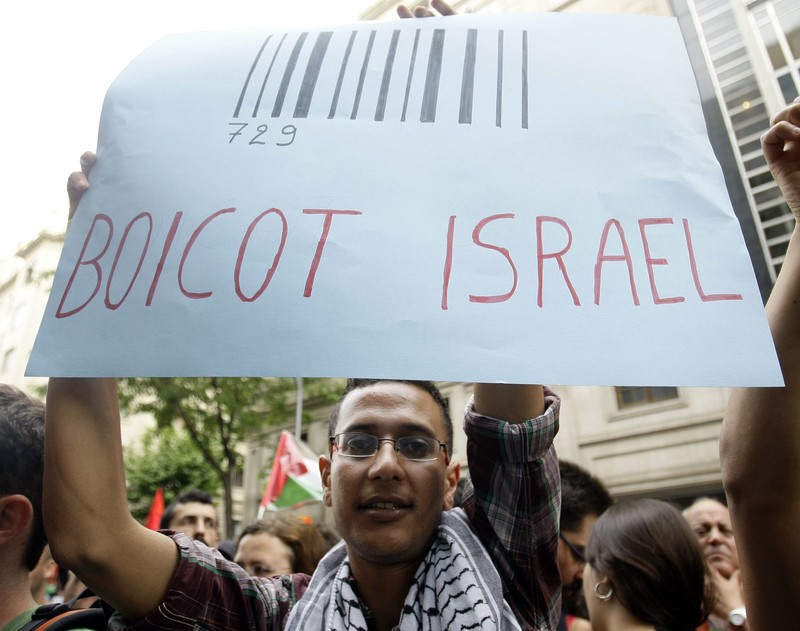Barcelona and Cambrils attacks: What we know so far
There have been two attacks in Spain's Catalonia region involving people driving cars at crowds at high speeds.
Here is what we know so far.
What happened?
On Thursday afternoon at 16:50 local time (14:50 GMT) a white van smashed into people on Las Ramblas, a famous boulevard in central Barcelona that runs 1.2km (0.75 miles) and was packed with tourists.
The van driver is said to have zig-zagged to try and hit as many people as possible along the pedestrianised area, knocking many to the floor and sending others fleeing for cover in shops and cafes.
He killed 13 people and injured more than 100, and managed to flee the scene.
Spanish police have described it as a terror attack.
What was the second attack?
About eight hours later, an Audi A3 car ploughed into pedestrians in the popular seaside resort town of Cambrils, 110km (68 miles) south-west of Barcelona, authorities said.
A woman who was critically injured later died in hospital. Five other civilians and a police officer were hurt.
The attackers' vehicle overturned and five people who got out, some of whom were wearing fake suicide belts, were then shot by police. Four died at the scene and one later died of his injuries.
Spanish police stop second attack. The Las Ramblas and Cambrils attacks are believed to be linked.
Who are police looking for?
A massive manhunt is under way to find 18-year-old Moussa Oukabir. He is suspected of using documents belonging to his brother, Driss Oukabir, 28, to rent the van that mowed down people on Las Ramblas.
Police say they cannot yet confirm he was the driver of the van, who fled on foot.
Driss Oukabir was arrested in Ripoll, a town in Catalonia, on Thursday.
An image of Moussa Oukabir, circulated in Spanish press and taken from social media
Catalonia's Interior Minister Joaquim Forn, quoted by the Associated Press, said: "We had local police on the scene, but we were unable to shoot him, as the Ramblas were packed with people."
Who else has been arrested?
Three others. One person from Spain's north African enclave of Melilla was arrested in Alcanar on Thursday, and two others were arrested on Friday, one in Ripoll.
Police said on Friday that three of those arrested were from Morocco and one was from Spain, but gave no details. It remains unclear how many people were involved in the plots.
What were the other incidents?
On Thursday evening at 19:30 local time, a car was driven into officers at a checkpoint on the outskirts of Barcelona.
The car was later found with a dead man inside it, but the interior ministry has denied earlier reports he was killed by police gunfire. Officials have not ruled out a connection with the Las Ramblas attack but investigations are ongoing
Aftermath of Barcelona attack in pictures
On Wednesday night, an explosion completely destroyed a house in Alcanar, 200km south of Barcelona, killing one person and wounding seven. The house was reportedly filled with bottles of propane and butane.
The house that blew up in Alcanar on Wednesday night. Picture shows lots of rubble and many gas canistersImage copyrightEPA
Police said on Friday that the blast had thwarted plans for an even bigger attack.
"They were preparing one or several attacks in Barcelona and an explosion in Alcanar stopped this as they no longer had the material they needed to commit attacks of an even bigger scope," said Catalonia police official Josep Lluis Trapero.
Also, on Thursday, not long after the first attack, a second van thought to be a getaway vehicle was found in the town of Vic, 80km north of Barcelona.
Who are the victims?
They come from all over the world, with at least 34 nationalities represented.
People from Ireland, the UK, France, Australia, Pakistan, Venezuela, Algeria, Peru, Germany, the Netherlands, Greece, Hong Kong, Taiwan, Ecuador, the US, Argentina, Romania, Cuba, Austria and the Philippines are all reported to be among those hurt.
Francisco López Rodríguez, a 60-year-old from Granada, is the first Spanish victim to be named. Belgium said one of its citizens had been killed and Italy's foreign ministry said two Italians had died.
France said 26 of its nationals were injured, 11 seriously. The Australian government said at least four citizens were injured, while a seven-year-old boy from Sydney is reported to be missing. Thirteen German citizens were wounded, some seriously.
A "small number" of Britons were injured, the Foreign Office says.
Who is responsible?
So-called Islamic State (IS) has said it was behind the Las Ramblas attack and that IS "soldiers" carried it out. But it did not provide any evidence or details to back up the claim.
Why Spain?
The country is one of Europe's most popular tourist destinations but in recent years has not seen the kind of jihadist violence that has rocked France, the UK, Belgium and Germany.
Still, Spain has been targeted before - several trains in Madrid, the capital, were bombed by al-Qaeda inspired militants in 2004, killing 191 people.
The IS news outlet, Amaq, said the attack was carried out as part of efforts to target states fighting in the US-led anti-IS coalition.
A few hundred Spanish soldiers are in Iraq, training local forces fighting the Sunni militant group.
How much jihadist activity is there in the country?
The number of operations carried out against jihadists has increased significantly since Spain raised its terror alert level to four out of five in June 2015, meaning there was a "high risk" of a terror attack.
Before these attacks, 51 suspected jihadists had already been detained in the country this year, while 69 were detained last year, and 75 were detained in 2015, according to El Pais.
Spain's long anti-terror experience
Security and surveillance was stepped up in the wake of truck attacks in the French city of Nice in July 2016 and the German capital Berlin in December.
On Twitter, the Spanish royal household posted: "They are murderers, nothing more than criminals who are not going to terrorise us. All of Spain is Barcelona."
How has the world reacted?
World leaders have offered support and message of solidarity.
British Prime Minister Theresa May said she was "sickened by the senseless loss of life in Barcelona".
US President Donald Trump quickly condemned the attack on Twitter but has come under fire for invoking a debunked myth about a general who fought Islamist militants by using pig's blood to commit mass executions.

 And I had, during seconds, a Déjà vu. Very strange. The victims of a situation are treated as livestock. But when people will see the real situation? The real horror of the situation?
And I had, during seconds, a Déjà vu. Very strange. The victims of a situation are treated as livestock. But when people will see the real situation? The real horror of the situation?


